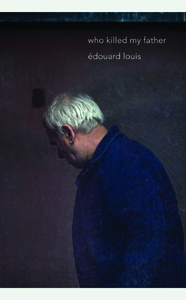 Édouard Louis, Who Killed My Father, translated from the French by Lorin Stein (New York: New Directions Books, 2018), 87pp.
Édouard Louis, Who Killed My Father, translated from the French by Lorin Stein (New York: New Directions Books, 2018), 87pp.
There's no question mark at the end of his book title, because for Édouard Louis there's no question who killed his father. Jacques Chirac did when he reduced the number of medications that would be covered by the state. Nicolas Sarkozy did when he campaigned against the deadbeat assistés of French society who wanted government handouts, and when he "incentivized" a return to employment for these bums. François Hollande did when he passed legislation that made it easier to fire employees. And Emmanuel Macron did when he reduced taxes for the rich and humiliated people like Louis's father as too lazy to work.
Édouard Louis (born 1992) is not yet thirty years old but he's already a literary phenomenon in France as an outspoken advocate for the sort of working class family that he grew up in. His best-selling autobiographical novel The End of Eddy (2014) was published when he was only 22, and has been translated into 20 languages. This non-fiction memoir recounts the violence, alcoholism, homophobia, and poverty of families like his, where his father was a factory worker in a "gray, ugly town" in northern France. The story begins near the end of his father's life, when he's suffering the consequences of a life of poverty and a back injury at work. He can barely walk. He needs a ventilator to breathe. He can't drive or bathe himself. He's barely fifty, writes Louis, and he "belongs to the category of humans whom politics has doomed to an early death."
In May of 2017 Louis published an op-ed in the New York Times entitled "Why My Father Votes for Le Pen," which is to say that this incendiary little book explores our contemptuous social perceptions of the poor and the consequent populist rage like the yellow vests in France, Brexit in England, and the "Occupy" protests in the United States. For "those who have everything," writes Louis, politics is almost always inconsequential, apart from aggravations and perhaps disgust. It never "ruins their digestion" or "breaks their backs." But for poor families like his, "you understood that politics was a question of life or death."
Dan Clendenin: dan@journeywithjesus.net


